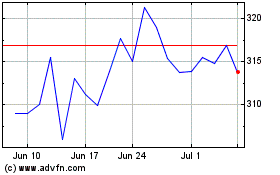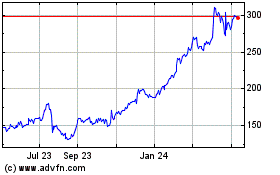By Newley Purnell
NEW DELHI -- The most popular music streaming service in India,
the world's biggest untapped digital economy, isn't from Spotify
Technology SA or Apple Inc. Instead, it is a local rival little
known outside the country.
Noida, India-based Gaana, named after the Hindi word for "song,"
has used a hyperlocal approach and cut-rate pricing to beat the
competition and attract 152 million monthly users. That is more
than half of Spotify's global user base, double Apple Music's
global count and far more than YouTube Music and Amazon.com Inc.'s
music services.
Indian consumers are flocking to Gaana, analysts say, because it
has been built for them. It has a library of more than 45 million
songs, mostly from India and in more than 20 regional languages,
including auto-tuned Punjabi-language pop ballads, Hindi hip-hop
and devotional tunes for the Hindu monkey god, Hanuman.
While some of its international rivals also boast voluminous
libraries of global hits, most lack the depth of regionally
specific songs from India that Gaana offers.
"You have to understand the consumption habits by region and
even by city," Gaana Chief Executive Prashan Agarwal said.
Gaana has an edge over international rivals because, he said,
its teams have more local knowledge, conducting research across the
country to uncover emerging artists and unlikely listening
trends.
With only about half of India's 1.3 billion people online,
global tech firms have been scrambling to establish themselves in
the world's biggest pool of new internet users. Hundreds of
millions of people are sending their first WhatsApp messages,
buying their first items online -- and streaming their first songs
-- as data prices plummet and inexpensive smartphones
proliferate.
"Every global player is trying to get a share in India," said
Abhilash Kumar, an analyst at India's Counterpoint Technology
Market Research. "The market is very nascent and not at all
saturated."
Many Indians have an intense relationship with music. It is part
of celebrations, religious worship, movies and cultural traditions.
Indians spend an average of 21.5 hours a week listening to music,
some 20% higher than the global average, according to consulting
firm Deloitte.
When the internet became affordable, music was one of the first
things that many Indians consumed on their smartphones. This trend
explains why the world's most-watched YouTube channel is T-Series,
which shows Indian music videos and has racked up tens of billions
more views than any other channel.
Sweden's Spotify and YouTube Music launched in India early last
year and have been advertising on billboards and online. TikTok
parent Bytedance Inc. last year chose India as one of two markets,
along with Indonesia, to test its first-ever music streaming app,
called Resso.
Apple Music and Amazon Prime Music have been available in India
for several years but haven't been able to match Gaana's
popularity.
International growth in emerging markets is key for Spotify. The
company has been looking to boost its listener base in new
countries like India. Dow Jones & Co., publisher of The Wall
Street Journal, has a content partnership with Gimlet Media, a unit
of Spotify.
Apple is eyeing digital services such as music streaming as it
faces a maturing smartphone market at home.
Music-streaming revenue globally hit $24 billion last year,
according to Counterpoint. India so far accounts for just a sliver
of that, some $200 million in 2019. But streaming revenues in India
are projected to climb to $400 million by 2023, according to
TechSci Research, and should continue to rise as hundreds of
millions of new digital listeners turn to their mobile devices for
music.
While Gaana has a head start, it will need to continue to
innovate to stay ahead of the competition, analysts say. Another
music-streaming service popular in India is JioSaavn, which is
controlled by Reliance Industries Ltd., one of India's largest
conglomerates. Many Indian consumers shop around continuously and
will abandon services if they find a better deal or juicier
offerings elsewhere.
Gaana's global rivals don't disclose recent user counts for
India but say they are also customizing their offerings for the
country. Many have offered plans at substantially lower prices than
in developed countries. Spotify, for example, launched a light
version of its app that takes up less space on phones.
Spotify says its service is growing quickly and that it aims to
appeal to all music lovers in India. YouTube Music says India is
one of YouTube's biggest video-viewing markets, and that the
company is seeing good adoption of its music streaming service.
Apple Music has worked to localize its offerings for the country.
Representatives for Amazon Music and Bytedance's Resso declined to
comment on their user counts or India strategies.
Gaana -- which launched in 2011 and is backed by Indian media
firm Bennett Coleman & Co. and China's Tencent Holdings Ltd. --
has developed special technical features for users in India.
Customers can search for artists or songs by voice, a benefit for
those with limited literacy skills or who have difficulty typing on
smartphone keyboards in Indic languages.
Gaana also offers price advantages. There is a free version with
advertising and paid plans starting at 12 rupees (17 cents) a month
for students. Spotify also offers a free version, but its least
expensive ad-free monthly plans start at around 80 cents. Apple's
service starts at about 70 cents, while YouTube Music starts at
about $1.10.
Gaana can charge less in part because, unlike its global rivals,
the service doesn't have to worry about undermining its product if
it charges significantly less in India than in other markets.
Gaana's mostly Indian music is also less expensive to secure
rights, analysts say.
While international players are still newcomers, Gaana is
leveraging the trove of data it has collected on users' listening
preferences to recommend new tunes, Mr. Agarwal said. That is a
bonus for first-time music-streaming consumers who are unfamiliar
with the interface.
Harshit Batra, a 20-year-old university student in New Delhi,
started using Gaana's premium service last year. He listens to
artists such as Indian composer A.R. Rahman and Pakistani singer
Atif Aslam, and said he prefers Gaana because it has a wider
selection of music and a simple user interface.
"My subscription expires this month," he said. "I plan to
renew."
Write to Newley Purnell at newley.purnell@wsj.com
(END) Dow Jones Newswires
February 02, 2020 09:20 ET (14:20 GMT)
Copyright (c) 2020 Dow Jones & Company, Inc.
Spotify Technology (NYSE:SPOT)
Historical Stock Chart
From Oct 2024 to Nov 2024

Spotify Technology (NYSE:SPOT)
Historical Stock Chart
From Nov 2023 to Nov 2024
